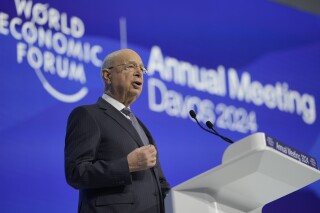The WEF’s chairman did not confess that a ‘political revolution’ is destroying his agenda

Klaus Schwab, Chairman of the World Economic Forum addresses attendees during the opening of the Annual Meeting of World Economic Forum in Davos, Switzerland, Tuesday, Jan. 16, 2024. Social media users are misrepresenting a speech Schwab gave in 2017 to falsely claim he admitted a “political revolution” is destroying his agenda. (AP Photo/Markus Schreiber)
CLAIM: World Economic Forum executive chairman Klaus Schwab admitted that his plan for a “Great Reset” is being destroyed by a “political revolution” against the idea.
AP’S ASSESSMENT: False. An article by a website known to publish misinformation misrepresented a speech Schwab gave on the future of governments worldwide at a 2017 conference in Dubai, three years before the WEF introduced the idea of The Great Reset. In reality, Schwab spoke about the need to develop new systems of government to reflect contemporary perspectives and what such systems could entail.
THE FACTS: Social media users are sharing a screenshot of a baseless article titled: “Klaus Schwab Admits ‘Political Revolution’ Against The ‘Great Reset’ Is Destroying His Agenda.”
One Instagram post that shared the screenshot reads: “We are the revolution!” It had received more than 2,700 likes as of Friday.
The article comes from a website called The People’s Voice, which was previously known as NewsPunch. The site has published numerous stories based on fabricated information, often about Schwab and the WEF.
The article provides no evidence to support its claim.
Yann Zopf, a WEF spokesperson, called it “a complete misrepresentation of the speech by Professor Schwab from 2017.”
“His words are taken out of context and misinterpreted to fuel absolute baseless conspiracy theories in order to discredit the important work that the World Economic Forum does on serious global challenges,” Zopf wrote in an email to The Associated Press.
Zopf also pointed out that the WEF’s 2024 Global Risks Report “found misinformation and disinformation to be the top risk for the world in the next two years” and that “unfortunately, more and more organizations are seeing a rise in fake news.”
The Great Reset is a broad proposal set out by the WEF in 2020 to reimagine social and economic systems. It has stoked a number of baseless conspiracy theories online.
As supposed proof of Schwab’s alleged admission, the People’s Voice article includes a clip from Schwab’s address at the 2017 World Governments Summit in which he says: “You have this anti-system movement — what we are seeing is a revolution against the system. So fixing the present system is not enough.”
Schwab then describes libertarianism as an “anti-system” that involves dismantling “everything which creates some kind of influence of government into private lives.”
At no point in his speech does Schwab admit that a “political revolution” is destroying The Great Reset initiative, which would not even be launched for another three years.
He speaks instead about how some governments have faced a backlash from people who feel globalization is not working to their advantage while others have chosen to re-erect walls, leading to “a world which is more anchored in yesterday and a world which probably is characterized by fragility and hostility.”
As an alternative, Schwab suggests that governments should instead develop new systems that are “in line with the new world which is unfolding.” For example, prioritizing both individual well-being and societal advancement.
The People’s Voice did not respond to a request for comment.
___
This is part of AP’s effort to address widely shared misinformation, including work with outside companies and organizations to add factual context to misleading content that is circulating online. Learn more about fact-checking at AP.


